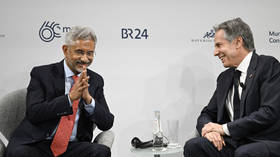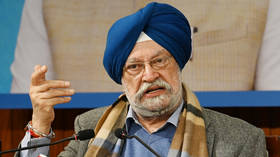India should be admired for ‘being smart’ – foreign minister

India should be admired, and not criticized, for conducting a “smart” foreign policy that allows it to maintain a balanced relationship with partners in the West, as well as countries like Russia, Iran and others that are heavily sanctioned, Indian Foreign Minister Subrahmanyam Jaishankar asserted at the Munich Security Conference on Saturday.
Jaishankar made the remark while fielding a question from Financial Times editor Roula Khalaf during a session that also featured his counterparts from the US and Germany – Antony Blinken and Annalena Baerbock.
Khalaf sought to question the Indian minister on New Delhi’s close trade and diplomatic ties with Moscow. “So you can pick and choose alliances and you can pick and choose topics… You still buy Russian oil; is that okay with your counterpart from the US. Your relation is fine? You can do whatever you want, whenever you want?” Khalaf pressed.
“Is that a problem? Why should it be a problem?” Jaishankar responded. “If I am smart enough to have multiple options, you should be admiring me. You should not be criticizing me.”
The Indian diplomat argued it is important “not to reduce the entire complexity of our world” into “sweeping propositions,” stating that “good partners provide choices, smart partners take some of those choices.”
India's External Affairs Minister (EAM) Subrahmanyam Jaishankar demonstrated diplomatic finesse during the Munich Security Conference. As he stood alongside US Secretary of State Antony Blinken and German Foreign Affairs Minister Annalena Baerbock, Jaishankar reaffirmed India's… pic.twitter.com/lBtj6GvPXf
— Sandeep Patil (@Sandeepatil_) February 18, 2024
Jaishankar’s comments come at a time when trade between the two countries has soared to all-time highs – exceeding an unprecedented $50 billion last year. Ajay Sahai, the director general and CEO of the Federation of Indian Export Organisations (FIEO), predicted that bilateral trade could reach $65 billion in 2024, as India ramps up exports to Russia.
New Delhi faces Western scrutiny as its purchases of Russian oil, coal, and fertilizers have soared since 2022 amid sweeping sanctions on Moscow. At the same time, India has abstained from voting on United Nations (UN) resolutions condemning Russia over the Ukraine conflict.
Top Indian officials, including Jaishankar, have underlined on various occasions that New Delhi’s stand on strategic and economic engagement with Russia stems from “pragmatism.” The country’s oil minister, Hardeep Singh Puri, stated earlier this month that Indian purchases of Russian crude played a pivotal role in stabilizing global oil and gas prices and mitigated global inflation, while ensuring that millions of people in the nation of 1.4 billion have three meals a day.
During his recent visit to Russia in December, Jaishankar affirmed that the bilateral relationship remains “very strong, very steady” and noted that the developments in various sectors, including trade, investment, and military-technical cooperation showcase the importance that New Delhi attaches to Moscow ties. In an interview with the Italian newspaper Corriere della Sera last year, he described the sanctions on Russia as “levers” that advanced economies have at their disposal and argued that “many parts of the world” do not accept the concept of sanctions.
Where India Meets Russia – We are now on WhatsApp! Follow and share RT India in English and in Hindi













